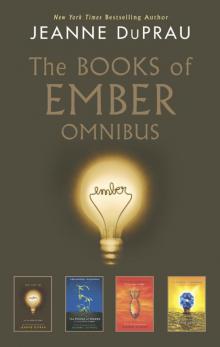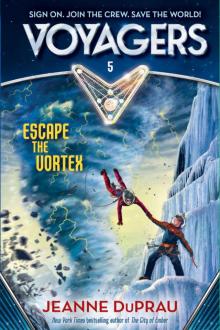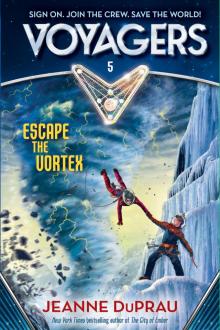- Home
- Jeanne DuPrau
Car Trouble
Car Trouble Read online
Table of Contents
Copyright
Car Trouble
Chapter 1
Chapter 2
Chapter 3
Chapter 4
Chapter 5
Chapter 6
Chapter 7
Chapter 8
Chapter 9
Chapter 10
Chapter 11
Chapter 12
Chapter 13
Chapter 14
Chapter 15
Chapter 16
Chapter 17
Chapter 18
Chapter 19
Chapter 20
The Last Chapter and The Last Phone Call
Car Trouble
By Jeanne DuPrau
Copyright 2016 by Jeanne DuPrau
Cover Copyright 2016 by Untreed Reads Publishing
Cover Design by Ginny Glass
The author is hereby established as the sole holder of the copyright. Either the publisher (Untreed Reads) or author may enforce copyrights to the fullest extent.
Previously published in print, 2005.
This ebook is licensed for your personal enjoyment only. No part of this book may be reproduced in any form or by any electronic or mechanical means, including information storage and retrieval systems, without written permission from the publisher or author, except in the case of a reviewer, who may quote brief passages embodied in critical articles or in a review. If you would like to share this book with another person, please purchase an additional copy for each person you share it with. If you’re reading this book and did not purchase it, or it was not purchased for your use only, then please return to your ebook retailer and purchase your own copy. Thank you for respecting the hard work of this author.
This is a work of fiction. The characters, dialogue and events in this book are wholly fictional, and any resemblance to companies and actual persons, living or dead, is coincidental.
www.untreedreads.com
Car Trouble
Jeanne DuPrau
Chapter 1
DUFF DEPARTS
He was ready. He stood on the front porch in the first light of dawn, with his duffel bag in one hand and in the other the carrying case that held his laptop computer. Out by the curb, his car awaited him—the small blue Ford Escort he’d bought last week from Pete at the pizza place. It was a little banged up, but in the yellow glow of the streetlamp it looked better than in daylight. He took a long breath of warm, grassy-smelling air and ran the heading of his trip program through his mind: BEGIN: THE GREAT CROSS-COUNTRY JOURNEY OF DUFFY PRINGLE.
Behind him the screen door creaked open. His father came out, holding a cup of coffee wrapped in both hands. He stood beside Duff and gazed out at the car. “If you run into problems,” he said, “you know what to do.”
“I know,” Duff said. “Call you right away.”
“And when you get there, you know who to call if you need help.”
“I know,” Duff said. “Wade Belcher.” Wade Belcher was some friend of his father’s from a million years ago who now lived in San Jose. He was in the furniture business. Duff did not intend to call him.
“All right, then,” his father said, nodding gloomily.
It was strange, Duff thought, not having to argue with him. For the last two weeks he’d argued nonstop with both parents: about how he ought to be going to college instead of to California, how he was too young to drive across the country alone, how there was probably some hitch to this job offer that sounded so good, and how he might know a lot about computers but he didn’t know a thing about the real world and would probably wind up in jail or in the hospital or dead. “This isn’t some computer program you can control by typing in a bunch of numbers,” his father had said over and over. “This is life.” He’d glare at him as if Duff had never heard of this advanced science called life and would never be able to master it.
But in the end, his parents didn’t forbid him to go. They gave in, finally. They understood that their son, Duffy, had to be something special if a company on the other side of the country wanted to pay him good money to fool around with their computers.
Again the screen door opened. Duff’s mother came out, rummaging through her purse for the name badge she wore at the restaurant. “Have you got your jacket, hon?” she said. “Did you pack some aspirin in case you get one of your headaches?”
Duff nodded. He’d forgotten actually. But he wasn’t planning to have any headaches.
His mother stood on tiptoe and kissed his cheek. “Promise to drive real carefully, okay? Don’t pick up any hitchhikers.”
“You’ve got your cell phone?” his father asked.
“Naturally,” Duff said.
“All right then,” said his father. “If you run out of money, just call.”
“I will,” said Duff, though he knew he wouldn’t. His father had no extra money. His business—Pringle Electric Works, Lamps & Lighting—never did much more than limp along. But Duff had the money he’d saved from working on weekends during his last year of high school; he was sure it would be enough for the trip.
He set down his bags and hugged his mom, who felt small and feathery in his arms. He hugged his dad, who felt large and stiff. Then he picked his bags up again and went down the steps to the street. His parents followed.
Duff opened the car door on the passenger side and laid his laptop on the seat, where it could ride next to him. The little computer was like a part of him—an external brain, a second pair of hands reaching out to the world. He put his duffel bag and a sleeping bag in the backseat. Then he got himself into the driver’s seat and rolled down the window.
“Bye,” he said to his parents, who had both bent slightly at the waist to look in at him.
“Call us from wherever you end up tonight,” said his father.
“Don’t forget,” said his mother. “Bye, dear.”
Duff turned the key in the ignition, and after a couple of coughs, the motor caught and hummed. He stepped on the gas and headed out into the street. It was so early that not a single other car was in sight.
Half a block on, he took one last look in the rearview mirror. His parents were still standing on the lawn, watching him go. He waved one more time, and they both waved back. Then he rounded a corner, they disappeared, and he was on his own, executing the first and most important line of his trip program: DRIVE WEST.
Chapter 2
ON (AND OFF) THE ROAD
He checked his watch. It was 6:03, Wednesday, June 26. He had six days to get from his hometown of Richmond, Virginia, to San Jose, California, which was approximately three thousand miles away. He would know exactly how many miles it was when he got there, because last night he had checked the car’s odometer and noted the mileage in his trip log: 137,462.
Now he guided the car through the streets of his neighborhood. Good-bye, Happy Day Restaurant, Art’s Video Rental, Hoover Market, all these places he’d known forever. Good-bye and good riddance, Coolidge High School, home of airhead jocks, tyrant teachers, and girls with mean eyes and mocking laughs. He was no longer a citizen of this dreary place. He was heading out, bound for the open road.
He reached over and turned on the radio. Out came a blast of hideous noise, like a chain saw with sand in its engine. He punched the buttons and twirled the dial, but every single station sounded either like the chain saw or like fifteen people talking at once in foreign languages. Finally he gave up and turned the radio off. It wasn’t really important. He’d brought along his iPod, loaded with his favorite music. The kind of music he liked wasn’t on the radio anyway.
The car seat seemed a little too far forward. He reached down and adjusted it. His legs had grown longer in the last year, turning him from a person of medium height to a truly
tall person, almost tall enough to play basketball, if he had wanted to.
Ahead was the ramp leading onto the Beltway. Duff drove up and saw before him not the open road but a solid carpet of cars, three lanes wide, creeping forward at about five miles an hour. It was too early for rush hour traffic. There must be an accident up ahead. Duff wedged his car into the line. This was not what he’d had in mind. He’d pictured a clean, high-speed departure, like an arrow shot from a bow. He himself was the arrow, shooting from the grungy old city to the glittering towers of the high-tech world.
He loved the sound of that: the high-tech world. Everything would be different in San Jose, California, the heart of Silicon Valley. His friends in San Jose would be people who talked about nanotechnology and artificial intelligence, not football scores and cars. He himself would be respected, finally. There would be no meatheads like Flynn Parker, who usually addressed Duff, when he spoke to him at all, as Loser Guy, and yelled, “Nerd attack! Take cover!” when he saw Duff coming into the cafeteria.
Duff didn’t like the word nerd. He preferred computer wizard techie, or even geek, all of which had an undertone of admiration that “nerd” lacked. He knew he appeared a little nerdlike—he couldn’t help it; it was what happened when you spent long hours in a darkened room peering at tiny characters on a screen. In the past few years, he’d begun to look rather like a large, furry, burrowing animal—his hair was soft and brown and the same length all over his head, and he had a habit of hunching up his shoulders, stretching his neck forward, and squinting as if he were nearsighted. He had noticed this in his senior yearbook picture, and in the snapshots his father took at Christmas. But he didn’t know what to do about it. Mostly, he didn’t think much about his looks.
Traffic was still crawling. An endless line of winking brake lights stretched ahead. Duff inched forward, stopped, inched forward some more. He drummed his fingers on the steering wheel. Pretty soon, he felt Desperate Octopus Mind coming on.
This used to happen to him a lot in school. The teacher would be droning on about something to do with laws or commas or exports of foreign countries, and there wouldn’t be a single interesting word to latch on to. His mind would start thrashing around like an octopus, stretching its tentacles out in search of nourishment, and he’d end up calculating the number of tiles in the ceiling or silently reciting the alphabet backward or writing computer code on his arm.
Now he entertained himself by figuring out how many miles he’d traveled so far. The odometer registered 137,470. He’d gone 8 miles. It was 6:28. A quick mental calculation: he’d averaged about 16 miles per hour so far. Not good. At this rate, it would take him fifteen days to get to California, if he drove for twelve and a half hours a day.
With the tip of his finger, he wiped some gritty dust from the dashboard display. This car was not exactly in pristine shape—it was a dirty white, with four doors, ratty orange upholstery, and a couple of dents in the back bumper. But a local mechanic had taken a look at it and said it was all right. The only thing wrong with it was that the dashboard lights didn’t work. That wasn’t important, though. Duff wouldn’t be doing much driving at night.
All he wanted was for this car to get him from the East Coast to the West. He wasn’t interested in its insides. He knew that boys were supposed to be born with a gene that attracted them to car engines. But he was missing that gene—he was much more attracted to search engines. Lying in the grease under a two-thousand-pound hunk of metal, bending over the mess of rods and coils under the hood, spreading rusted motor chunks all over the driveway—none of this appealed to him at all.
The car had cost him $625, which left him $1,010 of the money he’d saved working weekends at Clyde’s Computer Clinic. This seemed like a good number, for several reasons. It was composed of ones and zeroes, like machine language. One sounds like won, as in “I won!” And one means the beginning, which correlated with the beginning of his new life. Duff liked it when things worked out neatly like that. It was another reason he’d liked the amazing job offer—it came from a company called Incredibility, Inc., whose name began and ended with the same three letters.
In the months before he’d graduated from high school, Duff had put his resume out on dozens of Internet job boards and sent customized letters to sixty-one companies that he thought he’d like to work for. Nothing much came of all this. But over the Memorial Day weekend, he’d gone to a conference in Baltimore—it was mostly about game programming—and met a guy there who put him in touch with a friend of his in San Jose. This friend—Ping Crocker was his name—was just starting a company to produce what he called “mind-boggling new products for the entertainment software market.” His company was called Incredibility, Inc.
Duff looked up its website. It was flashy—brilliant colors, lots of animations, and sound effects including mad laughter and thunderous music. A little overdone, Duff thought, but definitely clever. He also did a search on “Ping Crocker” and “Incredibility, Inc.”
He didn’t find much, but he figured that was because the company was so new.
So he called Ping Crocker. Ping went on for twenty minutes about how Incredibility, Inc., was going to shape the future. They were ramping up for a project code-named “Rapid Vortex.” It was a game-like product, Ping said, only it was way, way more than a game. It would blast open the whole idea of games, he said. Actually, it was more like a whole new lifestyle for the game-oriented person. For this project they desperately needed someone with skills that just happened to match the ones Duff had. He mentioned a very acceptable salary. Would Duff be interested?
Duff would.
Even his father had to admit it was pretty amazing for such a job to be offered to someone only seventeen years old. Still, he wanted Duff to turn it down and go to college instead. Duff felt fairly sure there was nothing at college he needed or wanted to learn. The whole idea of college made him nervous—a vast campus swarming with people, required classes in difficult but useless things like English and foreign languages, dorms full of athletes and possibly even girls. High school had been bad enough. He would learn on the job, he told his father.
Up ahead, Duff saw a cluster of flashing lights. He’d been right—it was an accident causing this slowdown. In a few minutes, he was creeping past it: two badly crumpled cars standing at odd angles on the side of the road. One of them had apparently caught fire; it was streaked with black, and dripping wet. Firemen and highway patrol officers were standing around with two forlorn-looking people, presumably the owners of the wrecked cars.
Like everyone else, Duff stared as he went by, felt glad it wasn’t his accident, and drove on.
The traffic sped up right away. The speedometer needle was climbing toward thirty miles per hour. A few more miles and actual spaces opened up between the cars. Along the highway, Duff began to see green fields and trees. Soon he was going nearly fifty. This was more like it.
A stream of warm air rushed in the open window. The road was climbing up toward the hills. On both sides, dense woods made thick, billowy walls along the highway.
In San Jose, they had palm trees. He’d seen pictures of them on the Web. Living there would be like being on vacation in some tropical place all the time. He would find an apartment in a complex with a pool, and his salary would allow him to buy an even better computer system than he had now, plus any electronic gadget he wanted.
Ping Crocker had said he’d explain Project Rapid Vortex in detail after Duff arrived. Whatever this product was, Duff figured it would be a good start for a career that would eventually lead to great things. His goal was to invent something so spectacular that his name would start appearing in headlines: PRINGLE DEVELOPS NEXT-GENERATION SOMETHING-OR-OTHER! PRINGLE CALLED BOY WONDER OF 21ST CENTURY!
The truth was, Duff wanted to be important. He hadn’t done any great things in his life so far, but somehow he knew he had the power to do them—he felt it within him, as strong as an oak sprout pushing up through concrete. Sometimes
a sort of vision came to him: he saw himself immense, a giant standing astride the planet, one foot in New York, the other in Paris, a huge godlike figure to whom the citizens of the world looked up in awe. He wanted to do something that terrific. He didn’t know yet exactly what it was, but he knew it had something to do with the vast, bright, speedy universe of electronics.
The face of his former classmate Flynn Parker rose before his eyes, smirking. He wished he’d had the chance (and the nerve) to have a little conversation with Flynn before they left school. He would have said, “What’s next for you, Flynn? Gonna go work at Harvey’s Burger Barn?”
“No,” Flynn would say. “I’ve got a good job, geek-face. I’m working at the car wash.”
“Great,” Duff would say. “I’m going to California. Got a job in Silicon Valley.”
Flynn would probably sneer in that way that showed three teeth on the left side of his mouth and say, “Who cares, nerdbrain? I’d rather flip burgers than be as uncool as you.”
“How much are you going to make at your job, Flynn?” Duff would politely inquire.
“None of your business,” Flynn would say.
“Let me tell you what I’ll be making,” Duff would say, and he’d whisper the large figure of his monthly salary into Flynn’s little red ear. Flynn’s mouth would drop open and he’d look like a big dumb fish.
It was a satisfying scene.
In perfect contentment, Duff drove along Interstate 64 for the next three hours. His program was running smoothly. Ever since he’d planned this trip, he’d been thinking of it as a long computer program, composed mostly of the DRIVE command and direction indicators, and including subroutines that could be plugged in when needed, such as GET GAS, FIND PLACE TO EAT, and VIEW SCENIC SPOT. This was a habit he had, translating his life into a computer program. He didn’t do it on purpose—it just happened, because programming was so embedded in his way of thinking. Arguments with his father, for instance, often resembled infinite loops:
Dad: It’s bad for you to sit at a computer screen all day.

 The Prophet of Yonwood
The Prophet of Yonwood The City of Ember
The City of Ember The Books of Ember Omnibus
The Books of Ember Omnibus The Diamond of Darkhold
The Diamond of Darkhold Voyagers: Escape the Vortex (Book 5)
Voyagers: Escape the Vortex (Book 5) The City of Ember Deluxe Edition
The City of Ember Deluxe Edition The People of Sparks: The Second Book of Ember (Books of Ember)
The People of Sparks: The Second Book of Ember (Books of Ember) The People of Sparks
The People of Sparks Escape the Vortex
Escape the Vortex Car Trouble
Car Trouble The City of Ember: The First Book of Ember
The City of Ember: The First Book of Ember